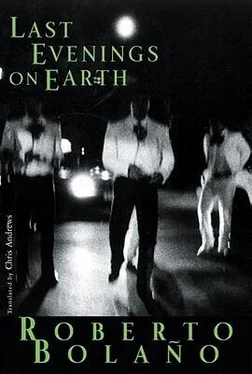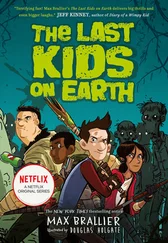During the discussion my friend got up, and I don't know if he was the only one, but he was certainly the first to say he didn't like the film, and why. I didn't like it either, but at the time I would never have admitted it. We became friends immediately. That night I discovered that he shared my admiration for Elizondo, and during the second summer of our friendship, we attempted to emulate the characters in Narda or Summer by renting a shack by the sea in Mazatlбn, not exactly the Italian coast, but, with a little imagination and good will, close enough.
Then we grew up and, looking back, our youthful adventures seemed rather contemptible. Young middle-class Mexicans are condemned to imitate Salvador Elizondo, who in turn imitated the inimitable Klossowski, or fatten slowly in business or bureaucratic suits, or flail around ineffectually in vaguely leftist, vaguely charitable organizations. Between them, Elizondo (whom I had stopped rereading) and the painter Cavernas just about sated our insatiable appetite for Culture, and each mouthful left us poorer, thinner, uglier, and more ridiculous than before. My friend went back to Irapuato and I stayed on in Mexico City and we both, in different ways, tried to distract ourselves from the gradual devastation of our lives, the ethics and aesthetics we'd professed, the Mexican nation and our damned useless dreams.
But we still had friendship and that was the main thing. And there we were, passably drunk by this stage, reminiscing about our youth, when suddenly my friend referred to the old Indian woman who had died of gum cancer and our conversation about art history and the particular; he mentioned the "two tracks" (though I could barely remember what they were supposed to represent), and finally he started talking about the restaurant where we had met Josй Ramнrez, which was where he had been heading all along, and he asked me what I thought of him, although from the way he put it I couldn't really tell if he was referring to the Indian boy or to himself, so to play it safe, I said, Nothing much, or maybe I shrugged in a noncommittal way. My friend immediately asked me if I thought, if the thought had crossed my mind, that there might be something between him and Josй Ramнrez (one of those awful, typically Mexican roundabout questions), and I said, No, of course not, man. How could you think that? Come on, don't worry. Perhaps I'm exaggerating or my memory is playing tricks, but perhaps not — the real chasm may have opened at that moment, the chasm I had sensed in the seemingly empty building, the one I had glimpsed as the Indian boy walked over to us for the first time, just as my friend, as it happened, was talking or ranting about the Indian woman and her corpse that seemed to keep shrinking, and then, perhaps because I was drunk, it all swirled together in my mind: the memories of our youth, the books we read, Narda or Summer by Eli-zondo, a living national treasure, our aspiring, make-believe summer in Mazatlбn, my girlfriend, who had decided out of the blue to make a new start, guided by her own sweet will, the years, Cavernas, my friend's art collection, the trip to Ira-puato, its calm streets, my friend's mysterious decision to settle down and work there, in his home town, when the normal thing to do would have been-And then he said: You have to get to know Josй. He stressed the verb know. You have to get to know him. And: I'm not. I'm not that way. you know. inclined. And then he talked about the dead Indian woman and the work of the cooperative. And he said: I'm not. you didn't think I was, did you? Of course not, I said. And then we went to a different bar and on the way there he said: Tomorrow. And I knew it wasn't the alcohol talking; tomorrow he would remember because a promise is a promise, isn't it? Of course it is. Then, trying to change the subject, I started talking about something that had happened to me when I was a child: I got stuck in the elevator of the building where we lived. Then I really was alone, I said. And my friend listened to me with a smile, as if he were thinking, What a jerk you've become, all those years in Mexico City, the stacks of books you've read and studied and taught, wherever it is you teach. But I went on: I was alone. For a long time. Sometimes (not often, to be perfectly honest) I still feel what I felt in that elevator. And do you know why I felt like that? My friend shrugged as if to say he couldn't care less. But I told him anyway: Because I was a child. I remember his reaction. He turned away from me, trying to see where he had parked the car. Bullshit, he said. Tomorrow you're going to see the real thing.
And the next day he hadn't forgotten. On the contrary, he remembered more than I did. He talked about Josй Ramнrez as if he were the boy's guardian. That night, I remember, we dressed as if we were going out to a singles bar or a brothel; my friend wore a brown corduroy jacket and I wore a leather jacket I had brought in case we went for a day trip into the country.
We began our tour with a couple of whiskies in a dim place near the center that smelled of aftershave. Then we went straight to the neighborhood where Josй Ramнrez hung out. We visited a pair of run-down cafйs, a restaurant (where we tried to eat although neither of us was hungry), and a bar called El Cнelo. Not a trace of the Indian boy.
When it was starting to look as if we had wasted the night, a curious night in the course of which we had hardly exchanged a word, we saw him, or thought we did, walking down a dimly lit sidewalk. My friend honked the horn and executed a reckless U-turn. Ramirez was waiting for us quietly on a corner. I rolled down the window and said hello. My friend leaned over in front of me and invited him to get in. The boy climbed into the car without a word. I remember the rest of the night as festive. Irrationally festive. It was as if we were celebrating the birthday of the young man in the backseat. As if we were his parents. As if we were his pimps. Or his minders: two sad white Mexicans protecting an enigmatic Indian compatriot. We laughed. We drank and laughed and everyone left us alone, sensing that to make fun of us would have been to risk life and limb.
We heard the story of Josй Ramнrez, or fragments of it; my friend thought it was wonderful, and, after a moment of puzzlement, so did I, though later, as we approached the unknown slopes of the night, to quote Poe, the story began to blur, as if the Indian boy's words could find nowhere to settle in our memories, which must be why I can hardly remember a thing he said. I do remember him telling us that he had attended a poetry workshop, a free poetry workshop, the literary version of the dental cooperative, although he didn't write a single poem, and at this my friend burst out laughing, but I didn't understand; I couldn't see what was so funny, until they explained that Ramirez wrote fiction. Stories, not poems. Then I asked why he hadn't signed up for a fiction workshop. And my dentist friend said, Because there aren't any fiction workshops. Don't you see? In this shit hole of a town the only thing they teach for free is poetry. Don't you see?
And then Ramirez started talking about his family, or maybe it was the dentist who told me about his family, but in any case there was nothing to say. Don't you see? Nothing. And I didn't really see, so just for something to say, I started talking about empty buildings and deception, but my friend silenced me with a gesture. There was nothing to say about them. Farmers. Dirt poor. Nothing to suggest that there was a genius in the family. Don't you see? I nodded compliantly, but in fact I didn't see at all. And then my friend declared that there were very few writers alive on a par with the boy sitting there before us. I swear to God: Very few. At which point he launched into an explication of Ramirez's work that chilled me.
Читать дальше












